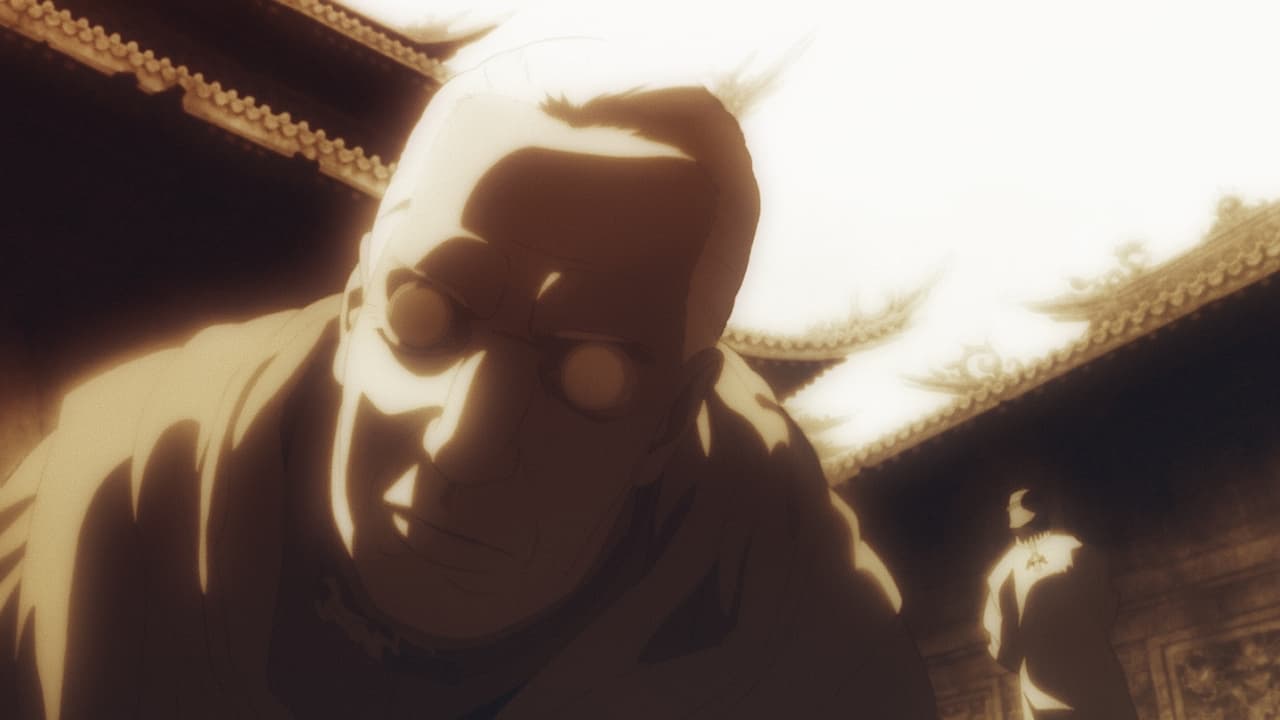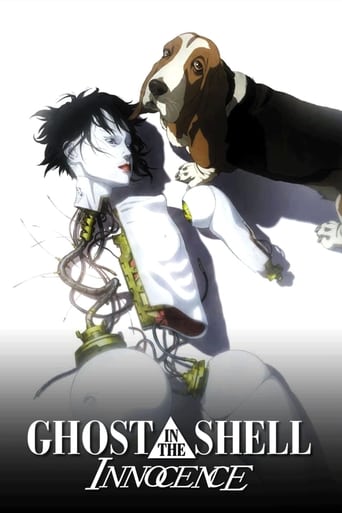

This is a review of "Ghost in the Shell" and "Ghost in the Shell 2: Innocence", two animated films by Mamouru Oshii. The titles of both films allude to the "ghost in the machine", philosopher Gilbert Ryle's description of Descartes' mind-body dualism. Both films spend much of their time drawing parallels between animals, pets, simple machines, human beings, augmented humans, cyborgs, computers and robots. Oshii then uses these parallels to introduce various questions regarding hard and soft free-will, predestination and nascent intelligence. Bored yet?Today many neuroscientists are quite happy to cast away the notion of both hard freewill and the Sovereign Self. Indeed, many recent experiments are starting to show that a large number of human activities, actions, thought processes etc are preconscious; they occur before we consciously decide to do them. To many eliminativist philosophers, The Self, what you think of as a free, independent agent, is but a phenomenal self model (an accidental byproduct of our senses) whose content is not innate but impersonally programmed by extrinsic sources. It's a relatively recently "built" neurocomputational model - not a soul or mental or coherent essence - which mistakes itself for an uncaused causer capable of initiating causal chains. Free-will is interpreted in a similarly reductionist light; man is not a free agent but a machine programmed or buffeted by a host of invisible triggers (social, external, environmental, biological, neurological, genetic, cultural, language etc), all of which are responsible for his actions, thoughts and subjective content. If the Self is Other, than Will is likewise.To Eastern religions, this is hardly radical. Indeed, the major religions of both the East and the West can be seen as a response to the Self. Very broadly speaking, Western monotheistic religions assert the existence of a God whose authority, strength, demands and wisdom keep the Self concrete, whereas Eastern religions try to weaken these ideas, and stress a kind of depersonalisation, or collapsing of all barriers. One side's ego boosting (you're real, you matter, free choice, a preoccupation with acquisition etc), one seeks ego death (self as illusion, let go, illusionary self, no bodies, only interconnected matter etc). Giving up the former idea is like man's rejection of geocentricism. When people started to see the earth as just another moving object, man was essentially displaced from the centre of the universe. Many were unsettled and alarmed by this idea. The status quo actively suppressed the Copernican revolution. Today the idea's accepted and viewed as being liberating and empowering rather than a threat.Today it's the eliminativist mindset that's deemed abhorrent. To such scientists, consciousness is severely limited and self understanding is particularly delusional. We are conscious of but a morsel of our external world, and even less of our internal, mental worlds. Our "inner and outer experiences" are themselves neuro-simulations that have been evolutionary fashioned for survival value, rather than representational truthfulness. The implication is not only that there is no "we", and that our consciousness is not "ours", but that consciousness is itself unconscious, highly inept. Most of our explanations and understandings of others, things, people and environments are themselves delusional, self-aggrandising fictions. What we say, think, feel, perceive, and do are but the consequences of deterministic physical (electro-chemical) processes in our neurons, and our own motivations and "reasons" are oft misunderstood, or may not even exist at all. We never actually decide on any of our actions; rather, our sense of choice and decision, and the reasons and motivations we cite for what we do, are all post-hoc rationalisations of processes that happen mechanistically via electrochemical cause-and-effect. All our rationales, and all our values, are themselves nothing more than consolatory fictions. Suicidal yet? This is taking a certain form of reductionism, or empirical materialism, to its extreme (Metzinger etc), and while it is "correct", neurobiology and cognitive psychology are still not advanced enough to tell us quite how "correct" it all is. We know little about the processes of "decision making" and scientists are still constantly (Walter J Freeman, Damasio, John McCrone etc) trying to rehabilitate the idea of "choice", teasing out nuances between voluntary and involuntary processes. One interesting line of study involves Cotard's syndrome, a pathological condition which results in a kind of "ego disturbance". Sufferers are unable to run "self simulations" and are unable to "perceive themselves" as being the "centre of their consciousness". Cotard's patients thus think they are dead, or deny their own existence. They stop using personal pronounces (I, me etc), refer to themselves as "it", rationalise their own non-existence and begin to develop a machine-like emotional "flatness". This – a conscious subject denying its own existence – of course seems bizarre to most, but such a form of existence denial highlights how incredibly fickle our own concepts of self-hood and existence are. Indeed, Cotard's syndrome heavily resembles the spiritual experiences reportedly induced and experienced by shamans and mystics. In both cases, the result seems to be a transition from a phenomenal self model (a simulational model with an "I" reference point), or subject model, to an object model (a decentralised simulation); a shift from a first person perspective to first-object perspective, in which the phenomenal property of "mineness" disappears from the patient's reality. This loss is theorised to be caused by either an extreme suppression of emotions, or a "glitch" which results in both affectlessness and, bizarrely, a replacement of "self concern" with something the patients describe as being "egoless" and "bigger". Studies also demonstrate that an increased awareness of the self-model as a model has the effect of making the self seem less real, which of course is akin to a scientific proof of a kind "spiritual enlightenment" (ie dissolution of the self).8.5/10 - "Shell 1's" more of a traditional action-anime, whilst Oshii cites Antonioni and Godard as an influence on "Shell 2".
... View MoreIts a very complex film, both in terms of its philosophical dialogue and the plot is also a little harder to follow than in the first film. Overall, I found it to be an attempt to be "bigger and better" than the first film that failed, somewhat. Still, a very good smart science fiction film about artificial intelligence and the meaning of what is being human.Note that my scores are pretty rigorous: I only give 7/10 for a great film. 99% of the films score lower than this one. It was probably among the best films of the year (2004). I use this scoring system to differentiate the very good films from the best.
... View MoreI am not a card carrying anime fan but I like the best of what all genres of film have to offer. Ghost 2 is a mesmerizing visual feast garnished with the best dialog I have ever witnessed in anime. The beauty of this movie is that it does not spoon-feed anything to the viewer. The plot is complicated but can be followed effortlessly. I saw a review that said the plot was murky. I don't understand why a viewer thinks they have to know everything about the plot. Does the director have to reveal all and make it easy to understand? Good art, in my opinion, is not easily understood. If it were easy to understand, it would require less thought. Less discoveries would be made about the artist and ourselves. The makers of this film have proved that it is possible to make an intelligent film with action. I was entranced by the mood and tone of the film. I found myself wishing I was in the world I was watching on the screen. I wanted to be there with the characters and walk the dark streets with them. It is a detective story AND an exercise in Philosophy, which, though a strange pairing, works beautifully here. The main characters wander through a hauntingly beautiful and dark future world seeking knowledge of themselves while they do battle with the evil men of their future. The dialog is peppered with philosophical and literary references that span the length of history and are not confined to the Eastern schools. Our heroes are never melodramatic or cheesy while bouncing philosophical quotes off of each other. This movie is pure poetry while maintaining a sharp edge. Hard to pull off.The Ghost in the Shell films are asking us, the viewers, a question. What is life? What are the differences between Man and Machine and what are the similarities? Where does meaning in our lives come from? Are we human because we feel, or are we more human when we sacrifice our feelings for the greater good? Which is superior? Man or machine? The fact that the director is challenging us to answer these questions for ourselves shows the mark of a true artist. Throw in the absolutely gorgeous visual side to the film, and its' mind-blowing action scenes, and you have a masterpiece of thought provoking entertainment. I would highly recommend only watching this at night or on a rainy day as it can only lend to the captivating mood of this movie. Quite simply it is one of the finest films I have ever seen- anime or otherwise.
... View MoreThe first Ghost in the Shell was phenomenal. It had all the philosophy, the action, and the cinematography to make it one of the greatest anime ever made. Without it, The Matrix would not exist. It's an important film. The sequel, Innocence, improves upon just about everything, and makes for a fantastic audiovisual experience. In fact, it might sound strange, but I think it's one of the best films of all time.First off, the hand drawn animation is quite three dimensional. Some people insist that it's rotoscoped, however what I've read and viewed says otherwise. The computer-generated imagery is brilliant, and creates an eerily beautiful environment for the feature. It still has that human touch.The plot is good, but the philosophy is really where the film shines. It asks us; what is a human? Is it the soul, or is it the shell? It challenges us, and leaves us with an interesting question still open for debate even after the movie is finished. In fact, it still is an open question after multiple viewings. It's a must-see for fans of the original, and is a great stand-alone film also for those new to the series. It's definitely worth watching. It's definitely one for purchase, and not for rental.
... View More